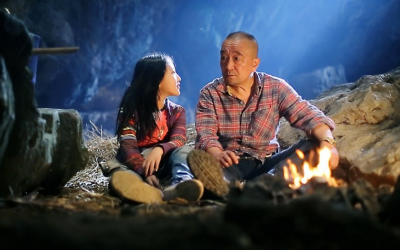Source: Variety
When people think of major international film festivals, the ones that usually come to mind are those that take place in the Western world. These include those that take place in North America, such as the Sundance and Toronto International Film Festivals, and those that can be found on the European continent, including the Venice and Cannes Film Festivals. However, if one looks outside these parts of the globe, they may find plenty of other film festivals that, while perhaps not quite as well known, still go out of their way to respect and honor the best that world cinema has to offer. One recent festival, for example, is the Jeonju Film Festival, which can be located in the city of Jeonju, South Korea. Currently taking place and set to conclude on May 7th, the festival has already showcased a wide variety of admirable and artistically captivating feature and short films. Despite the festival not ending yet though, many of its major awards have already been handed out; some may be puzzled as to why they have been given so early, but looking at the films awarded, it’s not hard to understand the judges’ enthusiasm.
This year’s festival is actually the first to be held mostly in person since 2019, as the previous two events had to change plans as a result of the COVID-19 pandemic. The 2020 festival took place entirely online and was delayed by an entire month, while the following 2021 event was a hybrid affair, with some screenings happening in person and others happening online. This most recent event, however, opted for a return to the usual festival-going procedure, with the 217 films included as part of the festival line-up, which hail from at least one of 52 represented nations, being exhibited at live events (although some were made available for streaming online). Needless to say, there’s a lot to choose from when it comes to selecting the best of the best, but as difficult as such decision-making must have been, a small handful of films were indeed chosen. Looking at those selected, it’s not hard to see why the judges decided in favor of such films.
Receiving the Grand Prize honor in the International Competition (that is to say those films made outside South Korea) was the Canadian documentary feature “Geographies of Solitude”, created by naturalist Zoe Lucas and experimental filmmaker Jacquelyn Mills. A chronicling of the natural ecosystem of Sable Island (which consists of sand dunes, wild horses, and several other kinds of wildlife and environments), the film first premiered in Berlin back in February of this year, and has since gone on to win several major awards. Three of these came from Berlin, including the CICAE prize and the Forum section’s Ecumenical prize, and it has a chance to pick up more when screened at the upcoming Hot Docs Festival in Toronto. Between these and its win at Jeonju, it’s safe to say that the documentary has a bright future ahead of it.
As for the Grand Prize award in the Korean Competition, “Jeong-Sun” was the film selected, with director Jeong Ji-hye accepting the prize on the film’s behalf. This dramatic film serves as a haunting cautionary tale of the harmful effects that cyberbullying and online shame can have on those whose private lives are exposed to the world without their consent, as it showcases a young factory worker whose life is turned upside-down after an intimate video of her is uploaded online and causes one troubling event after another throughout her community. In a day and age where social media is more prominent than ever, causing its impact on society as a whole to only grow stronger with the passage of time, the film’s message seemed to resonate quite well with those attending the Jeonju Festival, making its victory as the festival’s Best Korean Film feel all the more deserved.
Although “Geographies of Solitude” and “Jeong-Sun” were the big winners at this year’s festival, there were still plenty of other films receiving some kind of recognition. In the International Competition, the Best Picture Prize (the immediate runner-up to the more prestigious Grand Prize) went to “Unrest”, directed by Cyril Schaublin, while Special Jury Prizes went to “Tokyo Kurds” (directed by Hyuga Fumiari) and “The Silence of the Mole” (directed by Anaïs Taracena). In the Korean Competition, two awards for Best Actor were handed out, one to Oh Mine in Kim Jinhwa’s “Missing Yoon”, and the other to Ok Ja-yeon in Lee Wanmin’s “Archaeology of Love”. In addition, there were two CGV Arthouse Awards given out alongside all the others. The first of these two awards, the Upcoming Project Prize, went to “The Hill of Secrets” (directed by Lee Ji-eun), while the other, the Distribution Support Prize, was awarded to “Mother and Daughter” (directed by Kim Jung-eun).
Will the Jeonju Film Festival ever be seen as big and prestigious as those major film festivals found throughout the Western world? Probably not any time soon, but that doesn’t mean it deserves to go completely unnoticed. Whether the films shown at this annual festival come from within its native South Korea or hail from somewhere else in the world, it’s yet another opportunity for filmmakers to show off their work and take one step closer towards gaining international recognition. If anything, it’s smaller festivals like Jeonju that allow the festival circuit to have some artistic integrity and not just cater to those who have an excess of resources to worth with, and because of that, one can’t help but be even more interested in what these smaller events consider to be the best films they have to offer.




